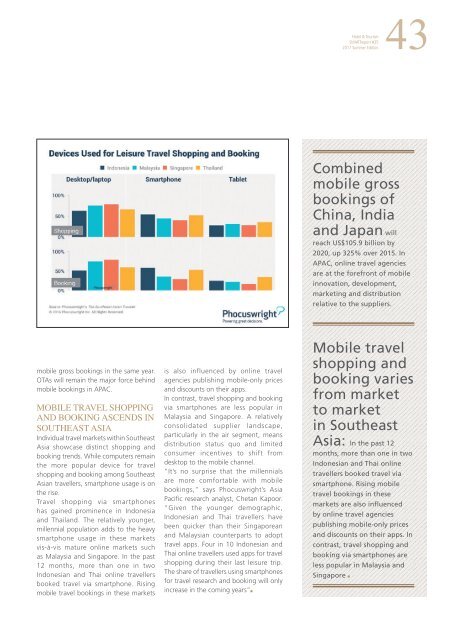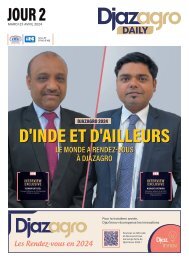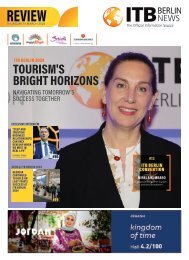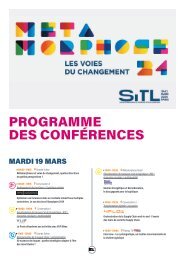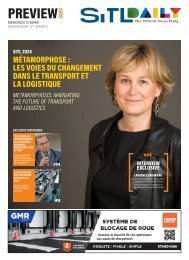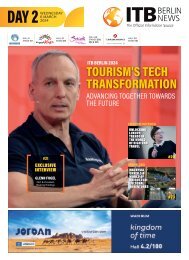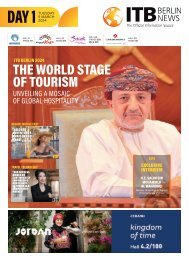Hotel & Tourism SMARTreport #35
Create successful ePaper yourself
Turn your PDF publications into a flip-book with our unique Google optimized e-Paper software.
<strong>Hotel</strong> & <strong>Tourism</strong><br />
<strong>SMARTreport</strong> <strong>#35</strong><br />
2017 Summer Edition 43<br />
Combined<br />
mobile gross<br />
bookings of<br />
China, India<br />
and Japan will<br />
reach US$105.9 billion by<br />
2020, up 325% over 2015. In<br />
APAC, online travel agencies<br />
are at the forefront of mobile<br />
innovation, development,<br />
marketing and distribution<br />
relative to the suppliers.<br />
mobile gross bookings in the same year.<br />
OTAs will remain the major force behind<br />
mobile bookings in APAC.<br />
MOBILE TRAVEL SHOPPING<br />
AND BOOKING ASCENDS IN<br />
SOUTHEAST ASIA<br />
Individual travel markets within Southeast<br />
Asia showcase distinct shopping and<br />
booking trends. While computers remain<br />
the more popular device for travel<br />
shopping and booking among Southeast<br />
Asian travellers, smartphone usage is on<br />
the rise.<br />
Travel shopping via smartphones<br />
has gained prominence in Indonesia<br />
and Thailand. The relatively younger,<br />
millennial population adds to the heavy<br />
smartphone usage in these markets<br />
vis-à-vis mature online markets such<br />
as Malaysia and Singapore. In the past<br />
12 months, more than one in two<br />
Indonesian and Thai online travellers<br />
booked travel via smartphone. Rising<br />
mobile travel bookings in these markets<br />
is also influenced by online travel<br />
agencies publishing mobile-only prices<br />
and discounts on their apps.<br />
In contrast, travel shopping and booking<br />
via smartphones are less popular in<br />
Malaysia and Singapore. A relatively<br />
consolidated supplier landscape,<br />
particularly in the air segment, means<br />
distribution status quo and limited<br />
consumer incentives to shift from<br />
desktop to the mobile channel.<br />
“It’s no surprise that the millennials<br />
are more comfortable with mobile<br />
bookings,” says Phocuswright’s Asia<br />
Pacific research analyst, Chetan Kapoor.<br />
“Given the younger demographic,<br />
Indonesian and Thai travellers have<br />
been quicker than their Singaporean<br />
and Malaysian counterparts to adopt<br />
travel apps. Four in 10 Indonesian and<br />
Thai online travellers used apps for travel<br />
shopping during their last leisure trip.<br />
The share of travellers using smartphones<br />
for travel research and booking will only<br />
increase in the coming years”<br />
Mobile travel<br />
shopping and<br />
booking varies<br />
from market<br />
to market<br />
in Southeast<br />
Asia: In the past 12<br />
months, more than one in two<br />
Indonesian and Thai online<br />
travellers booked travel via<br />
smartphone. Rising mobile<br />
travel bookings in these<br />
markets are also influenced<br />
by online travel agencies<br />
publishing mobile-only prices<br />
and discounts on their apps. In<br />
contrast, travel shopping and<br />
booking via smartphones are<br />
less popular in Malaysia and<br />
Singapore


